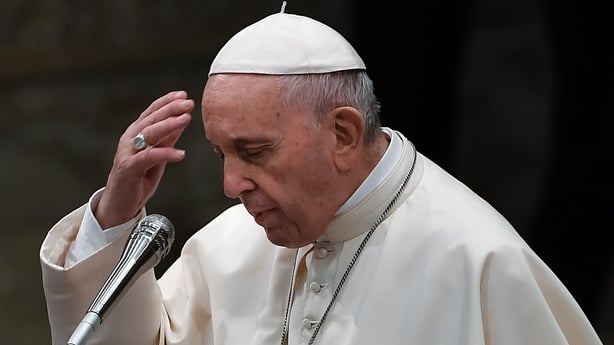
The chief spokesman for the Vatican has said that the issue of clerical sex abuse within the Catholic Church is a "cultural problem" which will not be changed overnight.
In an interview with RTÉ News on the eve of Pope Francis’ historic visit to Ireland, Greg Burke said that action would happen to tackle the problem of abuse within the church, but he played down suggestions that the Pope would announce specific measures during his trip.
"I think in 36 hours - or 32 hours on the ground - it’s hard to change a culture," he said.
He added: "Obviously, this is a cultural problem. The church, not only in the church obviously, we’re seeing a lot in society, but it is a cultural problem and the church will take responsibility for that, the very grave sins.
"I think the first thing the Pope will do is to show the acknowledgement of that.
"In terms of moving to actions - that will happen. But it doesn’t happen overnight. And people know that. People know that in the church and they know that in society as well."
Asked if the Pope might signal any concrete steps to deal with the problem during his trip to Ireland, Mr Burke said: "Let’s see what the Pope has to say. That’s really a key thing on this trip."
He added: "I think there is so much apprehension on all Pope trips. What we would like to see is, let’s first listen to the Pope, and that in itself is an important part of this."
Mr Burke said Pope Francis was excited about the trip, and was refreshed after the summer break.

He said: "He’s excited. The Pope has had plenty of time to get ready for the trip. It actually comes at a very good time because the Pope had July off, August has been a lot slower, [and] the Pope has had time to pray, and reflect and get ready for it.
"He’s well rested and he’s ready to go."
Mr Burke insisted that the abuse crisis within the church was not the main "subject" or "meaning of the trip."
Asked if the Pontiff was mindful of the contrast between this visit and that of Pope John Paul II in 1979, Mr Burke said: "The Pope knows that society is changing quickly, and I know there’s a lot of talk about Ireland and comparisons with 40 years ago.
"But all of Europe is changing. If you look at Ireland and the statistics, they’re very different from 40 years ago, but in terms of what is going on in Europe, and even Catholic Europe, Ireland is in pretty good shape.
"I think certainly it is a challenge, but the Pope doesn’t shy away from a challenge."
He told RTÉ News: "It’s clear that it’s impossible go to Ireland, after these decades, not just these recent years, these decades without addressing the issue and the pope certainly will."
Read more: Pope Francis in Ireland
On Monday the Pope issued a 2,000 word letter to "the People of God" in which he addressed the issue of the Grand Jury report into clerical abuse over several decades in Pennsylvania.
The Vatican spokesman said the chief reason for the Irish trip was the World Meeting of Families, and not the abuse issue.
"That’s not the meaning of the trip. And I would say that’s not the major subject of the trip. Having said that, the Pope will have to address it. He will," Mr Burke said.
He added: "It comes right after this letter to the People of God...which is sort of a first - I wouldn’t say it’s the first time the church has recognised it - but it’s a very deep and personal view of the Pope on the issue, so that will form a background to it.
"I think he’s well aware of the situation in Ireland and having listened to a lot of victims he comes knowing and feeling their pain."
He said Pope Francis would address the key importance of the family in society.
"The Pope is always talking about the family as a school of virtue. It’s not just the Church where you learn what’s right and what’s wrong.
"You learn a lot more from the family, you learn respect for the elderly. Essentially you learn not just respect for others, but how not to think only about yourself, he talks about it as a school of solidarity.
"So you see the importance of the family, for the entire society."







